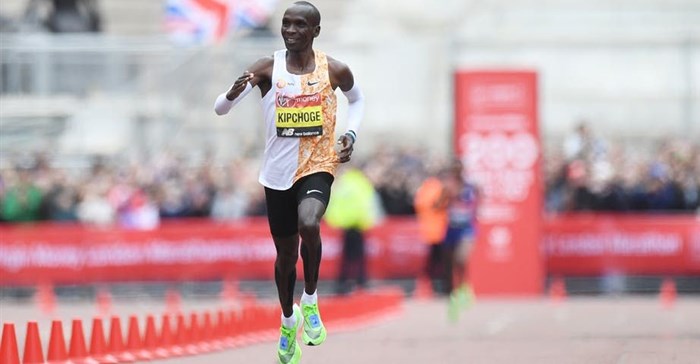Kipchoge's marathon success remains a mystery: some clues from my research

In 2018, Kipchoge not only won the Berlin Marathon: he also broke the world record, completing 42km in 2:01:39. Earlier in 2019, he ran the second fastest marathon in history, in London.
Kipchoge, then, is virtually unbeatable over the 42km distance. This raises questions about his physical and mental strength and willpower. How does he do it? Is he superhuman?
Kipchoge isn’t the only Kenyan athlete to dominate the world’s record tables. Since the 1960 Rome Olympics, Kenyan runners have enjoyed unparalleled dominance in distance running events, from 800 metres to the marathon. Together with their Ethiopian neighbours, Kenyan athletes have not only dominated long-distance Olympic races but have also dominated the world cross-country and road-racing circuit.
So it is not surprising that questions abound about what makes Kenyan runners so talented. A plethora of studies have sought the answer, or answers. And they have come up with several possible reasons to elucidate the phenomenal performance of Kenya runners.
I have come to my own conclusions based on research that I have conducted on various aspects of Kenyan athletes over the past two decades. I have published several research papers on the subject. Some of the papers have looked at the exemplary performance of the Kenyan runners through different lenses.
In one of the publications, colleagues and I investigated the demographic characteristics of elite Kenyan endurance runners participating in international competitions. We tracked their evolution over the period of their international emergence and current dominance. In another paper, we looked at the running performance, nationality, sex and age in marathon running between 1999–2015. In 2005 my colleagues and I looked at the food and macronutrient intake of elite Kenyan distance runners.
Based on this body of knowledge and empirical data I would observe that Eliud Kipchoge’s extraordinary and excellent performance has a lot to do with his mental strength, physical fitness, diet, and great running economy which enables him to utilise oxygen and generate energy more efficiently. Overall, there is an interplay between nature and nurture in the success of Kenyan runners.
Read more:
Why Kipchoge's spectacular Berlin run sets the stage for faster marathons
Admittedly, my research does not answer all of the questions surrounding the performance of Kenyan runners. More research still needs to be done to explain and fully understand the phenomenon.
Explanations about Kenyans
Researchers propose a series of explanations for the outstanding success of Kenya’s elite athletes in general. Some experts attribute their prowess to favourable physiological characteristics. Such characteristics include, among others, maximal oxygen uptake, higher ability of the body to convert certain fats to energy, particularly during prolonged periods, and the ability to efficiently consume oxygen.
Sports scientists like myself have also linked their success to their diet, which is typically high in carbohydrates and low in fat. Their protein intake matches that of other elite athletes. Generally, the staple diets of Kenyan runners include ugali (stiff porridge made from maize or millet flour), green leafy vegetables, milk, kidney beans, and eggs.
Genetic makeup is another factor. But studies have been unable to prove that Kenyan athletes are genetically adapted towards distance running. One thing that does work to their advantage, however, is the fact most of them were born and raised at high altitude. The body produces more and bigger red blood cells at high altitude. This increases oxygen delivery to the muscles and boosts performance.
Another factor to consider in analysing the dominance of Kenya’s athletes is the long distances they ran to and from school as children – often up to 10km one way. Many of them also engaged in daily physical activities such as farming, herding animals, fetching firewood and water. Experts believe that this led to the development of high aerobic capacity which means that their bodies take in more oxygen and use it more efficiently to generate energy.
Finally, some researchers have suggested that Kenya’s long-distance runners have a psychological and social advantage because they now see themselves as unbeatable on the global stage. This psycho-social edge over other long-distance runners has developed among Kenyan runners because they have an aura of invincibility, both in their own and their opponents’ minds.
Eliud Kipchoge’s case
Explanations for Kipchoge’s performance have included physiological characteristics like genetic endowment, and advantageous environmental conditions, such as being born and raised at high altitude.
Based on my own empirical research, most of which aligns with previous studies, I have come to the conclusion that – like many other successful elite athletes – Kipchoge’s success has a lot to do with a unique interplay between nature and nurture. This includes, but is not limited to, genetics, physiology, nutrition, coaching, and mental and emotional preparedness.
Kipchoge is at his peak. In 2017, he tried to become the first person to run a marathon in less than two hours. He will make a fresh attempt this year and I have no doubt that he can do it.
This article is republished from The Conversation under a Creative Commons license. Read the original article.![]()
Source: The Conversation Africa

The Conversation Africa is an independent source of news and views from the academic and research community. Its aim is to promote better understanding of current affairs and complex issues, and allow for a better quality of public discourse and conversation.
Go to: https://theconversation.com/africa





















